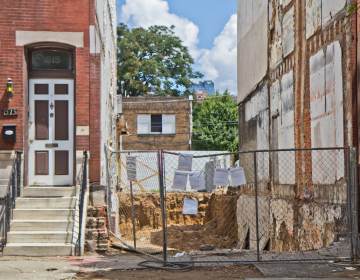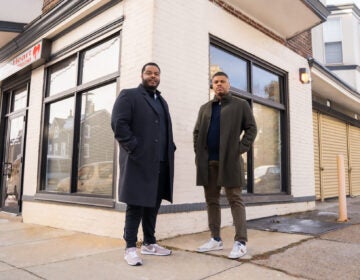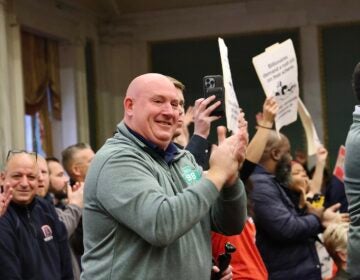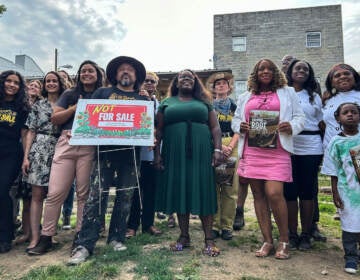‘We’re doing it’: Black Philadelphians are diversifying unions. They want support
After several years of seeing Philadelphia fail to meaningfully diversify the city’s booming construction and building trades, Black workers want change.

Robert Paul is a recruiter for Sheet Metal Workers Local 19. He said he doesn't rely on the city to help and instead heavily recruits in churches. (Taylor Allen/WHYY)
After several years of seeing Philadelphia fail to meaningfully diversify the city’s booming construction and building trades, Black workers want change.
More than 50 construction labor unions call the greater Philadelphia region home but only one, the Laborers District Council Local 332, has a predominantly Black membership.
“We’re still talking about inclusion? I’ve been off the set for 17 years, that’s sad,” Randy Jubilee, a contractor turned business owner of Jubilee HVAC Group said Tuesday at a panel discussion hosted by the West Philadelphia Promise Zone’s Workforce and Economic Opportunity Committee. “If we’re truly about it, make it happen. Put in the residency requirement for apprenticeships like it used to be, you build up the tax base, you stop the violence, and give more opportunities for jobs because if we’re going to be real about it, quotas don’t work.”
Robert Paul is a sheet metal worker with 49 years of experience. After decades of frustration, he stopped waiting for the city to help diversify the trades and became a recruiter for the union.
“Everybody wants to talk about it, make a lot of hoopla, and make it this big long struggle,” Paul said. “Well, I don’t want to hear that.”
He focuses on recruitment at his church, Piney Grove Baptist Church, and offers help to anyone who needs help passing aptitude tests. He even brought seven young members that he is recruiting from his church to the panel.
“We’re doing it,” he said. “We take 12 weeks to teach you the seven parts of that test. And once you pass it, you still have to come back and we get you ready for the interview part. I want people in this union to look like me.”
Maurice Harris, an experienced electrician for over 30 years, described his struggles with getting passed over at times in his career for promotions that went to less experienced white counterparts. Still, he chooses not to dwell on it.
“This is where mentorship comes in so you won’t be shocked by the atmosphere,” Harris said. “You can’t take a lot of stuff personally and you keep moving for your own professional [career]. You ask others how they also overcome it.”

A call for accountability and solutions
Harris and others believe city government should be doing more to mandate more diversity in the unions — especially on public projects supported by taxpayers.
Popular ideas among the crowd included helping prospective Black workers to prepare for competency tests, mentorship, and forcing developers to promise they will employ Black residents in community benefit agreements. A recent CBA signed by Shift Capital and the Broad-Germantown-Erie Collaborative committed the developer to invest $150,000 in job training for North Philadelphia residents and hire city residents for 50% of the jobs created by the construction of a N. Broad Street apartment project.
“Philadelphia has a problem,” Soneyet Muhammad, moderator and Promise Zone’s Co-Chair of the Workforce and Economic Opportunity Committee said. “We have an overwhelmingly Black and brown population and a disportionate amount of our low-income residents are Black and brown. Labor unions in the construction trades are a powerful tool to correct this disparity.”
According to Muhammad, 80% of steelworkers, 77% of sheet metal workers, and 74% of carpet installers in the city are white in Philadelphia. Muhammad also mentioned that none of the building trade unions are mandated to report their gender and racial makeup of their membership except for Local 542 for operating engineers.
Last year, Hilco Redevelopment Partners, the real estate firm taking over the shuttered Philadelphia Energy Solutions refinery in South Philadelphia, won public support for the project with a plan to increase diversity in the building trades with a goal of 50% of its workforce identifying as non-white and a detailed plan to create career pathways for Philadelphia public school students. But that project is just one of many and the plan is at this point just that.
Lark Jackson, a panelist and the Gender Equity Program Director for the National Center for Women’s Equity in Apprenticeship and Employment, said she understands that no one wants empty promises from the government.
To combat that, Jackson said she’s advocating for monitoring those goals and posting figures that expose inequities online because “there’s power to posting these numbers online because you’re calling out where commitments aren’t being made.”
In her advocacy work, she wants public reporting of participation goals twice a month and community and labor representatives monitoring compliance.
Still, the idea wasn’t enough to appease the crowd.
Sean Talley is from Mantua within the boundaries of the Promise Zone and is constantly looking for work.
“We’re rarely put on these jobs and not only are people not on the site that look like me, they aren’t even from the neighborhood,” Talley said. “What are we supposed to do?”
He said the only jobs he was able to get in his neighborhood was when he just showed up to a site and a coordinator recognized his zipcode. He was assigned that day.
The panel event went overtime and had to be cut short because of the crowd’s frustrations.
“It’s all empty promises,” Talley said.
 WHYY is one of over 20 news organizations producing Broke in Philly, a collaborative reporting project on solutions to poverty and the city’s push towards economic justice. Follow us at @BrokeInPhilly.
WHYY is one of over 20 news organizations producing Broke in Philly, a collaborative reporting project on solutions to poverty and the city’s push towards economic justice. Follow us at @BrokeInPhilly.

Subscribe to PlanPhilly
WHYY is your source for fact-based, in-depth journalism and information. As a nonprofit organization, we rely on financial support from readers like you. Please give today.









